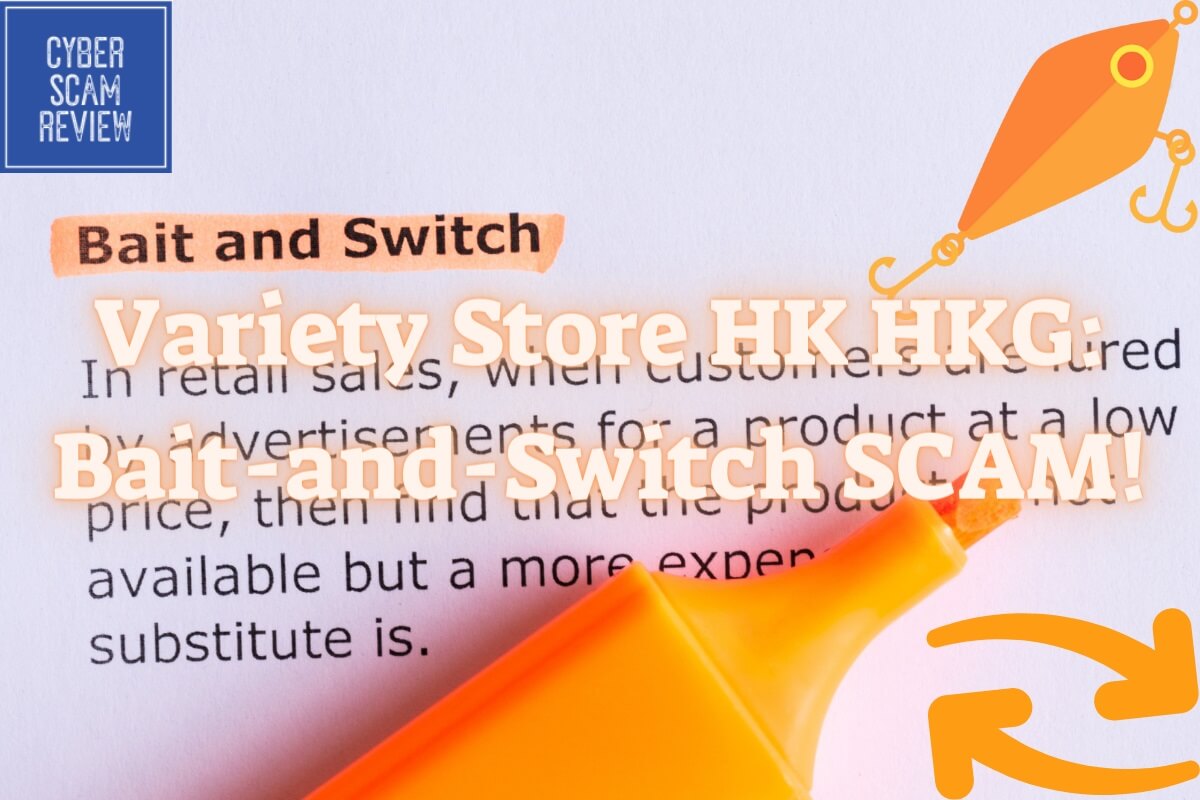Today we’re looking at the Bait and Switch Scam. This scam takes advantage of online shoppers’ trust in e-commerce platforms and sellers. Consumers must be cautious and conduct thorough research before purchasing from unfamiliar online stores, such as “Variety Store HK HKG.”
The “Bait and Switch” scam is a pervasive deception in online and offline markets. In this scheme, a seller lures customers with the promise of a product or service at a meager price, only to reveal that the advertised item is no longer available once the consumer is engaged. The seller then attempts to push a more expensive or less desirable substitute.
In brick-and-mortar stores, this tactic was once common in retail and auto sales, where customers might be drawn in with advertised deals and steered towards higher-priced options.
In the digital age, the scam has evolved and proliferated. Online marketplaces, travel booking sites, and electronic retailers are among the sectors where modern versions of this scam frequently occur. Misleading advertisements on social media platforms and phishing emails enticing consumers with too-good-to-be-true deals are standard digital baits.
Despite being illegal in many jurisdictions, the bait and switch scam remains a significant issue, as enforcement is challenging due to its subtle and ever-changing nature and because it often goes unreported by embarrassed victims or those unaware they were deceived.

Origins and History
The origins of the “Bait and Switch” scam are difficult to pinpoint, but it has likely existed for as long as commerce. The term began gaining traction in the early 20th century in the United States, initially associated with brick-and-mortar retailers. These sellers advertised products at low prices to lure customers into their stores, only to redirect them to more expensive or profitable items under various pretexts.
Consumer protection laws, such as the U.S. Federal Trade Commission established in 1914, aimed to curb such deceptive practices, explicitly condemning bait-and-switch tactics by the mid-20th century in many Western nations. Despite these regulations, the strategy persisted, evolving to skirt the law and remaining prevalent in auto sales and real estate industries.
With the rise of the digital age, the bait-and-switch scam has found a new, expansive playground. The surge of online shopping, propelled by the widespread adoption of the internet in the early 21st century, has seen this scam proliferate in virtual marketplaces—from travel booking sites to e-commerce platforms. In this digital realm, sellers use enticing digital advertising to attract consumers. Once engaged, customers often find the original offer unavailable and are redirected to pricier or less desirable alternatives.
Today, sophisticated algorithms can personalize ‘baits’ based on users’ browsing history, making scams appear more convincing and challenging to detect. With its intricate web of online retailers, digital advertisements, and social media, this interconnected world has provided the bait-and-switch scam with a vast, fertile ground, showcasing its enduring and adaptable nature.
Get in touch with our affiliated Cryptocurrency Forensic Specialists at CNC Intelligence for free by filling out the form below.
Real-life Examples
The EZ Scooter Scam (Variety Store HK HKG)
On June 20, 2023, an unsuspecting consumer took the bait of an irresistible deal: an EZ scooter advertised for only $44.94. Eagerly, they paid using their Discover card, expecting to receive the sleek, efficient scooter advertised. To their dismay, what arrived was a completely unrelated item—a pair of sunglasses. The consumer, now a victim, had fallen prey to a bait-and-switch scam.
Vendor Details:
- Name: Variety Store HK HKG.
- Evidence: The order and confirmation details indicate the purchase was from this vendor, serving as critical documentation for the victim.
The scooter has not arrived despite possessing all necessary transaction details and proof of purchase. The victim has made multiple attempts to contact Variety Store HK HKG, seeking a refund for the product they paid for. The vendor’s response, if any, has been elusive and unsatisfactory, typifying the ‘avoidance’ stage of the scam.
Unbeknownst to the victim at the time of purchase, Variety Store HK HKG had a history of similar complaints. A trove of negative reviews recounting similar experiences can be found at Albertsome / Supic Company Limited Reviews. This website is a virtual testament to the broader reach of the scam, revealing that this incident was not an isolated case but part of a pattern of deception.
This case study, sadly, mirrors countless others, wherein consumers are lured by a tantalizing offer, only to be duped into receiving something far less valuable or entirely different than what was advertised, with sellers that vanish or prove unhelpful when accountability is sought.
Mechanics of the Scam
In the “Bait and Switch” scam, particularly prevalent in online shopping contexts, a clearly defined sequence of deception is employed to defraud the consumer. Here’s the breakdown:
Bait
To begin, scammers craft enticing advertisements. They present a highly desirable product or service, such as a high-end scooter dubbed the ‘EZ Scooter’ in this instance, at an irresistibly attractive price.
These ads, often polished and professional-looking, are strategically placed where they are most likely to catch the eyes of potential victims—be it in social media feeds, email inboxes, or prominent positions on e-commerce platforms.
Switch
The core of the scam occurs after the victim is sufficiently enticed to make a payment. Expecting the advertised product, they instead receive an item starkly different from what was promised.
In this scenario, instead of the anticipated EZ Scooter, the victim is shipped a cheap and unrelated item, such as a pair of sunglasses.
This part of the scam capitalizes on the element of surprise and the victim’s initial confusion, during which the scammer is busy covering their tracks.
Avoidance
Post-purchase, when the victim realizes the deception and seeks redress, the scammer deploys tactics to evade responsibility and extend the deception. They may become entirely unresponsive to any communication attempts from the victim, effectively disappearing from the radar.
Alternatively, they might employ a more insidious strategy, offering many excuses, creating intentional delays, or providing fake tracking numbers or fraudulent ‘proof’ of shipment.
These tactics are designed to frustrate the victim further, often leading them to abandon their efforts to recover their losses and giving the scammer more time to disappear completely.
This orchestrated sequence of ‘Bait, Switch, and Avoidance’ is the hallmark of this notorious scam, which continues to adapt and thrive in the ever-evolving landscape of online commerce.
Variations of the Scam
The “Bait and Switch” scam is not monolithic; it adapts to various contexts, taking on different forms depending on the industry and medium deployed.
Real estate might involve advertising a great price only to tell potential buyers the property just sold, directing them to more expensive or less desirable listings. Retail stores might advertise a high-demand item at a deep discount but stock an inadequate supply. When customers arrive, they find the item is ‘sold out’ and are guided towards higher-priced alternatives.
Online marketplaces are particularly fertile grounds for variations of this scam. For example, an online seller might list a popular product at a low price but with a high shipping fee, nullifying any discount. In another variation, the seller might advertise a high-quality item but send a knock-off or counterfeit version.
In the service industry, a common adaptation is offering a basic service at an incredibly low price to get a foot in the door. Once engaged, the provider claims that more expensive services are necessary, pressuring the customer into pricier options.
Another twist can be found in digital advertising, where scammers use ‘clickbait’ offers that require a user to sign up for a recurring subscription or complete a purchase to access an advertised deal. After the sign-up, the original offer is often less valuable or more restrictive than initially presented.
Recent years have also seen the emergence of a technology-aided version of the scam, where sophisticated algorithms personalize and target ‘baits’ based on users’ online behavior, making the scams more convincing and harder to detect.
These variations all share a common thread: the deceptive practice of luring customers under false pretenses, then pushing a different product, service, or terms to capitalize on the consumer’s engagement, showing the versatile and adaptive nature of this age-old scam.
Prevention Tips
Navigating the marketplace, especially online, requires vigilance to avoid falling victim to the “Bait and Switch” scam. Here are essential tips to help consumers recognize and steer clear of potential scams:
- Research Vendors Thoroughly: extensively research the seller before making online purchases. If applicable, look for a physical address, contact information, and a valid business license.
- Check Reviews and Ratings: Prior customer experiences are valuable. Read reviews and check ratings on trusted consumer websites. Negative reviews should be a red flag, especially those describing experiences resembling a bait and switch.
- Be Wary of ‘Too-Good-To-Be-True’ Deals: Extreme discounts or offers significantly lower than competitors’ prices should be approached cautiously. Scammers use such deals as bait, and if it seems too good to be true, it probably is.
- Use Secure Payment Methods: Opt for credit cards or well-known payment platforms, which often offer fraud protection, instead of direct bank transfers or wire payments. Avoid sharing personal information unnecessarily, and never send cash.
- Read the Fine Print: Scammers often hide important details in the terms and conditions. Make it a practice to read these documents thoroughly to understand what you are agreeing to. Look for hidden fees or clauses that allow for a substitution of products.
- Report Suspicious Activity: If a deal feels shady, report it to us by leaving a comment below. Your report may help prevent others from becoming victims.
The importance of reading reviews and conducting thorough research cannot be overstated. It allows consumers to gauge the seller’s credibility and the deal’s authenticity. Secure payment methods are equally critical, providing additional protection between the scammers and your hard-earned money. By vetting sellers meticulously and adhering to these recommendations, consumers can significantly reduce their risk of falling prey to the “Bait and Switch” scam.
Legal Implications
“Bait and Switch” scams are unethical and illegal in many jurisdictions, reflecting the serious stance that authorities take against such deceptive business practices.
- Laws and Regulations: In the United States, for example, the Federal Trade Commission (FTC) prohibits deceptive advertising, which includes “Bait and Switch” tactics. Similarly, the European Union, Canada, and Australia, among other nations, have consumer protection laws that explicitly prohibit deceptive marketing.
- Potential Consequences for Perpetrators: Violating these laws can result in significant consequences for scammers. Penalties might include substantial fines, mandated compensation to victims, revocation of business licenses, and, in severe cases, criminal charges. These penalties aim to deter deceptive practices and protect consumers from predatory behavior.
Recourse for Victims of Scams such as Variety Store HK HKG
- Report the Scam: Victims are encouraged to report the scam to us and the relevant authorities. In the U.S., this would be the FTC through their website or a local consumer protection agency.
- Seek a Refund: Victims should first attempt to resolve the issue with the seller by requesting a refund. If this proves unsuccessful, they may initiate a chargeback through their credit card provider or payment platform, which might return the lost funds after investigating the claim.
- Take Legal Action: If other avenues for redress prove unfruitful, victims may consider pursuing a lawsuit against the deceptive seller. Legal action could result in compensation for the victim, and it also helps to hold scammers accountable.
Victims must retain all relevant documentation of their transactions, including advertisements, receipts, and correspondence with the seller, as these can serve as vital evidence if legal action is pursued.
The legal implications of the “Bait and Switch” scam are substantial and wide-reaching. They underscore the gravity with which these deceptive practices are viewed by legal systems worldwide and highlight the various avenues that victims have to seek justice and compensation.
Complaints We Received
On August 23, 2023, we received the following complaint:
We ordered two beach chairs and were supposed to get two free, but we never received them.
Variety Store HK HKG Bait & Switch Scam Warning Conclusion
In today’s digital age, where shopping from the comfort of one’s home has become the norm, the “Bait and Switch” scam has evolved to exploit this convenience, making vigilance more critical. Our exploration of this deceptive practice has revealed that these scams can lead to significant financial loss for the victims, but the impact often extends beyond monetary terms. The emotional distress, frustration, and erosion of trust in online marketplaces are equally debilitating consequences that victims suffer.
Awareness is, indeed, the first step toward prevention. Educating oneself about the red flags of such scams, taking the time to research vendors, and maintaining a healthy skepticism towards deals that seem too good to be true are indispensable practices for safe online shopping. Importantly, secure payment methods act as a safeguard, offering protection that can differentiate between a successful purchase and a regrettable scam.
Furthermore, the responsibility to combat these scams extends to all of us. Sharing our knowledge and experiences is not just an act of self-preservation—it is a community service. By talking openly about scams we have encountered and warning friends and family members about the risks, we contribute to a broader culture of awareness and caution. These shared stories become powerful tools in preventing others from falling prey to similar schemes.
So, as we navigate the vast and ever-expanding world of online commerce, let us do so with our eyes wide open. Let’s commit to sharing the warning signs and stories with our communities, reinforcing a network of informed, vigilant consumers. In doing so, we protect ourselves and contribute significantly to safeguarding others.
Remember, a cautious consumer is a scammer’s worst enemy. Stay safe, and always be cautious when making online transactions.
Please comment below if you have fallen victim to online scams, such as the Variety Store HK HKG scam. If you have suffered a substantial financial loss, do not despair. We are here to assist you in recovering your funds!
When you comment, your name, comment, and the timestamp will be public. We also store this data, which may be used for research or content creation in accordance with our Privacy Policy. By commenting, you consent to these terms.

